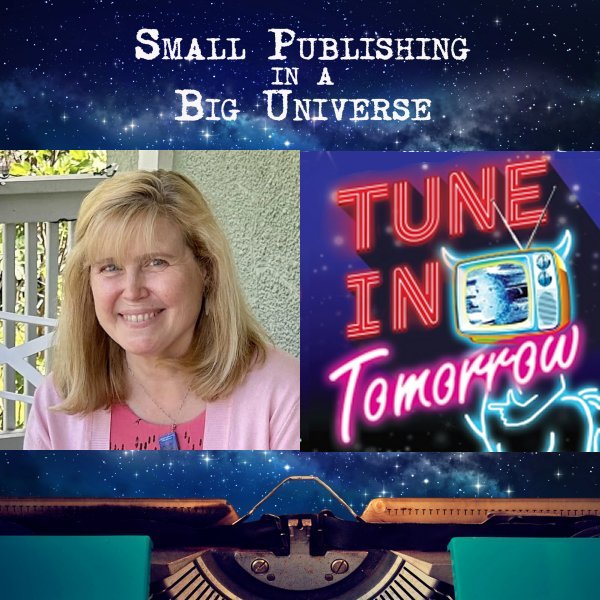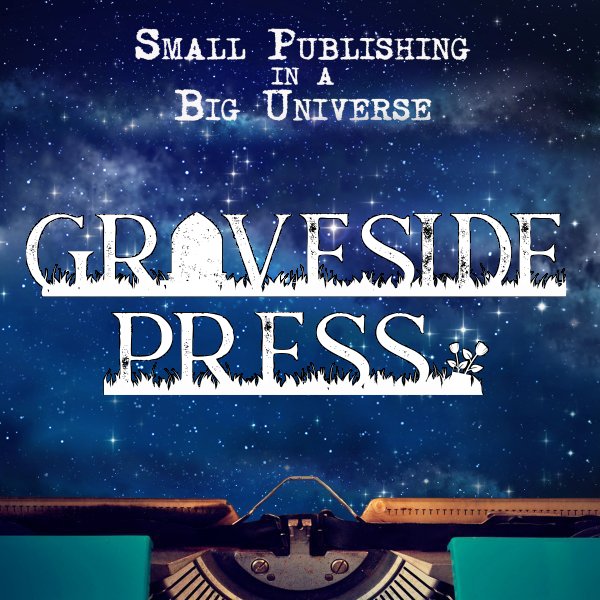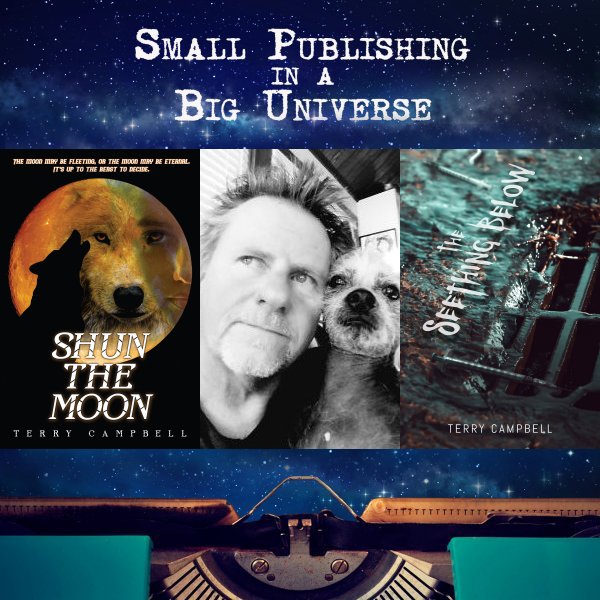[00:00:07] Speaker A: Hello and welcome to small publishing in a big universe. I am your host, Lisa Jacob, from our sponsors this month, Water Dragon Publishing has the working by Bright Flame and Dragon. The Psychic on the jury by Brian Ce Boolean Mel Walker is a psychic and prefers to be off the grid. But now that he's got a real job, he finds himself summoned to for jury duty, selected as one of the jurors. Something doesn't seem right with the case. He goes against the rules and visits the scene of the crime. Using his abilities, he discovers the real killer. Now he just needs to prove it to the rest of the juror. The Psychic on the Jury by Brian Ce Boole is available in ebook and paperback editions from Amazon, Barnes and Noble, Kobo, Smashwords and other online booksellers. Or support your local independent bookstores by ordering it through bookshop.org dot. For more information, visit their
[email protected].
[00:01:24] Speaker B: This is small publishing in a big universe. Can you introduce yourself, please?
[00:01:29] Speaker C: It looks like Kate, but it's Kat because it's Irish, not English. So it's Kat Gordon. And I am a disabled, autistic queer author from Canada, and I like to write stories that celebrate diversity.
[00:01:44] Speaker B: What is your most recent book about?
[00:01:47] Speaker C: My latest work is season one. Iris and the crew tear through space, and it's a disability hope punk adventure starring the crew of a science vessel. And the crew is disabled, deaf, neurodivergent, blind. They are selectively speaking, non vocally speaking, or they manage mental illness. They belong to a galactic network where accessibility and accommodation are the norm. Their villains are ableist pirates who try to outwit them. But you really think I'm going to let ableist pirates out with them?
[00:02:19] Speaker B: Not just why did you write this book, but how did you do it?
[00:02:23] Speaker C: I am also a disability advocate, and I've been in community with a wide array of amazing people with body mind diversity, a real healthy community that I used to be hash disabledandalone, and I was filled with a lot of internalized ableism, you know, just lots of fear that I just started meeting one after the other, different kinds of folks from, with different kinds of body minds. And I I realized, wait a minute, disability doesn't mean the end. It's just we require different accommodations to thrive. So I just changed a lot of my attitude. And why did I write Iris and the crew? First of all, I love space opera, love it to bits. And I think I just wanted the star of the book to be just a loving, healthy, nurturing, supportive disability community. Except in their world, because accessibility and accommodations are the norm. They don't know what the word disabled means as applied to living being. So they don't have disability pride. They just go and live their lives. Their accommodations are there, and the ship is massively accessible. The assistive tech is sentient. Oh, it's fun. It's very, very fun for me to.
[00:03:38] Speaker B: Do that because it's hope, punk. Do you hope that this is what will happen, is that accommodations will become the norm?
[00:03:46] Speaker C: There are easily perceived disabilities. Like you said, if you see someone using a wheelchair, you'll perceive they have a disability, but there are disabilities you can't easily perceive. And the nickname for that is invisible disabilities. And that could be even an autistic person like myself who's good at masking. And you can't tell at the time that I'm struggling with all kinds of sensitivity issues and processing issues. There's so much diversity within disability, and I really wanted to capture that I tend to use the word disabled, describe myself, take it as an identity. There's a lot of disabled people who take that word as an identity, but there are also disabled people who prefer person first language. And so they'll say they're, I'm a person with a disability. So when I say disabled, it's not like, oh, it's a terrible word. In fact, a lot of times we're saying it's not a bad word.
[00:04:40] Speaker B: But when people say the word disabled, they immediately have negative connotations with that.
[00:04:45] Speaker C: That's right. And there are so many narratives out there, socially and medically, about disability being a negative thing. I have to use a mobility device called a rollator. It's a walker with wheels that I push around. It's like a stroller without a baby. When I meet a new doctor, a new medical professional for the first time, it's like, is that yours? You're so young to be having that, et cetera, et cetera. And I said, hey, this allows me to move. So, yeah, I am disabled without my mobility device. With my mobility device, I'm not disabled. And I guess my theory is if we adapted things like universal design, where all houses had ramps, that would be part of standard design. All doorways were a certain way, if counters were easily adjustable. And the social model of disability is we don't consider the disabled person as an afterthought. They are right away considered in accessibility everywhere. So I was inspired by those real on earth concepts when I was doing the world building for iris and the crew. And so they don't know that they're disabled because they are not actually disabled. They, according to our eyes, they have different kinds of neurodiversity and disability, but in their world they just use whatever assistive tech or whatever mental health professional they need or physiotherapist, and they just go and live their lives. I love this book so much. I needed to write this book very badly. The pandemic was hard for people who have chronic conditions and disabilities. We were often just told nobody's going to be affected by Covid except for this disabled people, except for the chronically ill people. And that was almost a eugenics based daily message. And I had to go somewhere else. I had to go somewhere where we were celebrated, where people cared, where people were happy, and that you mattered. No matter what kind of body or mind you had, you mattered. I'm a humor author too, so I needed to go just be funny as well.
[00:06:50] Speaker B: You're writing disabled characters in a accommodating world. Do you ever write disabled characters in our world?
[00:06:58] Speaker C: Yeah. I am a speculative fiction writer, so I prefer writing inspect. I'm currently working on something that would be in a not so distant future. I'm actually exploring that. So I want to celebrate myself, who I am. I don't want to feel like I'm less than. And so I guess that reflects through my fiction sometimes.
[00:07:21] Speaker B: Do you want them to figure you're just fine the way you are? This is just what I got.
[00:07:24] Speaker C: First of all, I don't think I'm a tragedy in any case. So I don't want anybody feeling sorry for me at all. And I prefer not to be helped for ordinary things, like there should be a way for me to get inside the building. I like independence of movement. I want to be able to open a door. I want to be able to take an elevator if there are conferences. A lot of times I have asked for quiet spaces. When you're autistic, there's a lot of noise, a lot of interaction, and sometimes we need to retreat to a very quiet space. So I've asked for those kinds of accommodations. So asking for accommodations is just a part of making everybody feel welcome. So we could just go and not have our hands held or anything and just kind of go and have a good time. When I write the characters I write because I don't have every disability in the world, I have to rely on listening to people who have lived experiences. I have to rely on sensitivity editors with lived experiences. But unless I'm writing about my own lived experience through a character. I just pull back a little so it doesn't seem like I'm trying to say that I know exactly what it's like to live like this person. I just want enough of that character lived experience in there so that a reader can say, hey, I like this. And get excited that there's a character in book that's like them. Because a lot of times disabled people are written by non disabled people and the tropes are harmful. So I'm very sensitive to that.
[00:08:57] Speaker B: You've also edited books with disabled characters in it, am I correct?
[00:09:01] Speaker C: Yes. My best friend Talia C. Johnson and myself co edited two disability themes speculative fiction anthologies called nothing without us and nothing without us too. That was fun because we'd never done that before. And I still don't believe someone trusted us to do it. We did the first one, nothing without us because I thought out loud to my publisher in a kind of little autistic blurty moment saying, you know, I wish there was an anthology. And like, you know, just by disabled people. I don't know how I'm going to do that. And then Nathan from press Renaissance press said, oh, we'll do it. I was like, what if I can't do that by myself? Oh, get Talia to help you. So that's two people who never did intelligence before. But you know what? It was a great experience because even the responses to the calls for submissions we were getting authors who were disabled who were saying, I don't know if you're going to accept my story, but can I just say thank you that you're doing this and if I don't get it, I'm still going to buy it. And that was powerful. Nothing without us was nominated for an Aurora award. But more importantly, it's been taught for several years at Trent University as part of a disability studies course. To find out it's being taught in university was so that was very exciting. And we talked to the students several times. It was awesome. Its younger sister is nothing without us too. And that book won the Aurora award last year. So we went from being complete noobs to now award winning anthology editors. I can't believe it happened. And I was there.
[00:10:48] Speaker B: Are you going to do another anthology of the same sort or are you done with anthologies? Because I know that anthologies are very hard to do.
[00:10:57] Speaker C: I am so glad you said that anthologies are hard to do because they are. And I really respect all anthology editors now. I get it. I get what they go through. It's a ton of work. No, we're not planning to do any more on the nothing without us series. We're going to end on that high note. I want to go back to being an author for a little while, and that's why Iris came out.
[00:11:21] Speaker B: Where can people contact you?
[00:11:24] Speaker C: There is a way for people to contact me through my website. My website is catgordon.com, so that's cait gordon.com and I'm on instagram, threads and bluesky at C A I T G. So cat g author and cat is c a I t. Sorry.
[00:11:43] Speaker B: Thank you very much kat.
[00:11:45] Speaker C: Thank you so much for having me.
[00:11:52] Speaker A: A working is a spell that will save the environment sale is the coven leader of a group of witches, including one in training. Her land is wanted for a pipeline, but she refuses to sell. She enlists the help of her coven mates, who all have their own issues, to help drive away the corporation that wants the land. The working by Brightflame is available in hardcover, paperback, and ebook editions. This book is available from Amazon, Barnes and Noble, Kobo, smashwords, and other online booksellers. Or support your local independent bookstores by ordering it through bookshop.org dot. For more information, visit their
[email protected].
thanks again to our guest, Kate Gordon. We plan on publishing new episodes every second Wednesday of the month. Watch for new episodes around that time. If you want to know more about small publishing in a big universe, visit our website at sPBU dash podcast.com and subscribe to our newsletter. Send us your feedback by using the contact us link like us on Facebook spbupodcast. Contact us on XPU Underline podcast. To find out more about the books and other products featured during this episode, please visit the small publishing in a big universe marketplace at SPBU Dash marketplace.com. this podcast was recorded and edited by yours truly. Lisa Jacob executive producer is Stephen Verdecki. Theme and ad music provided by Melody Loops enhanced transcription services are provided by Lisa Jacob. This episode was sponsored by Water Dragon Publishing and paper Angel Press. You can listen to our podcast on Apple Podcasts, Spotify, Amazon Music, and most of your favorite podcast services. Thank you very much for listening and talk to you soon.


